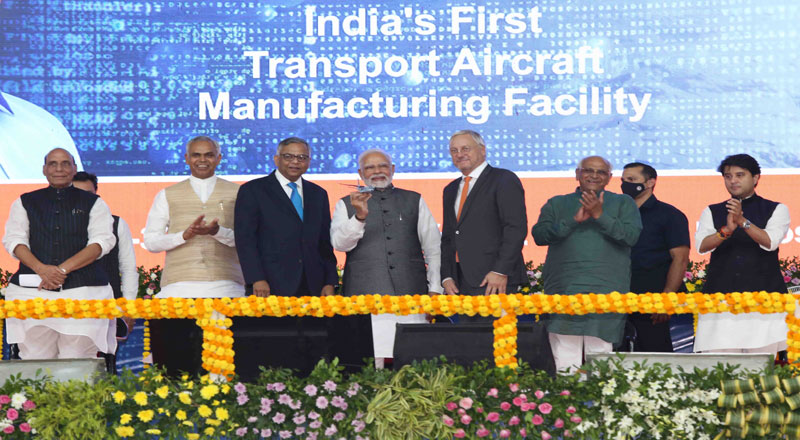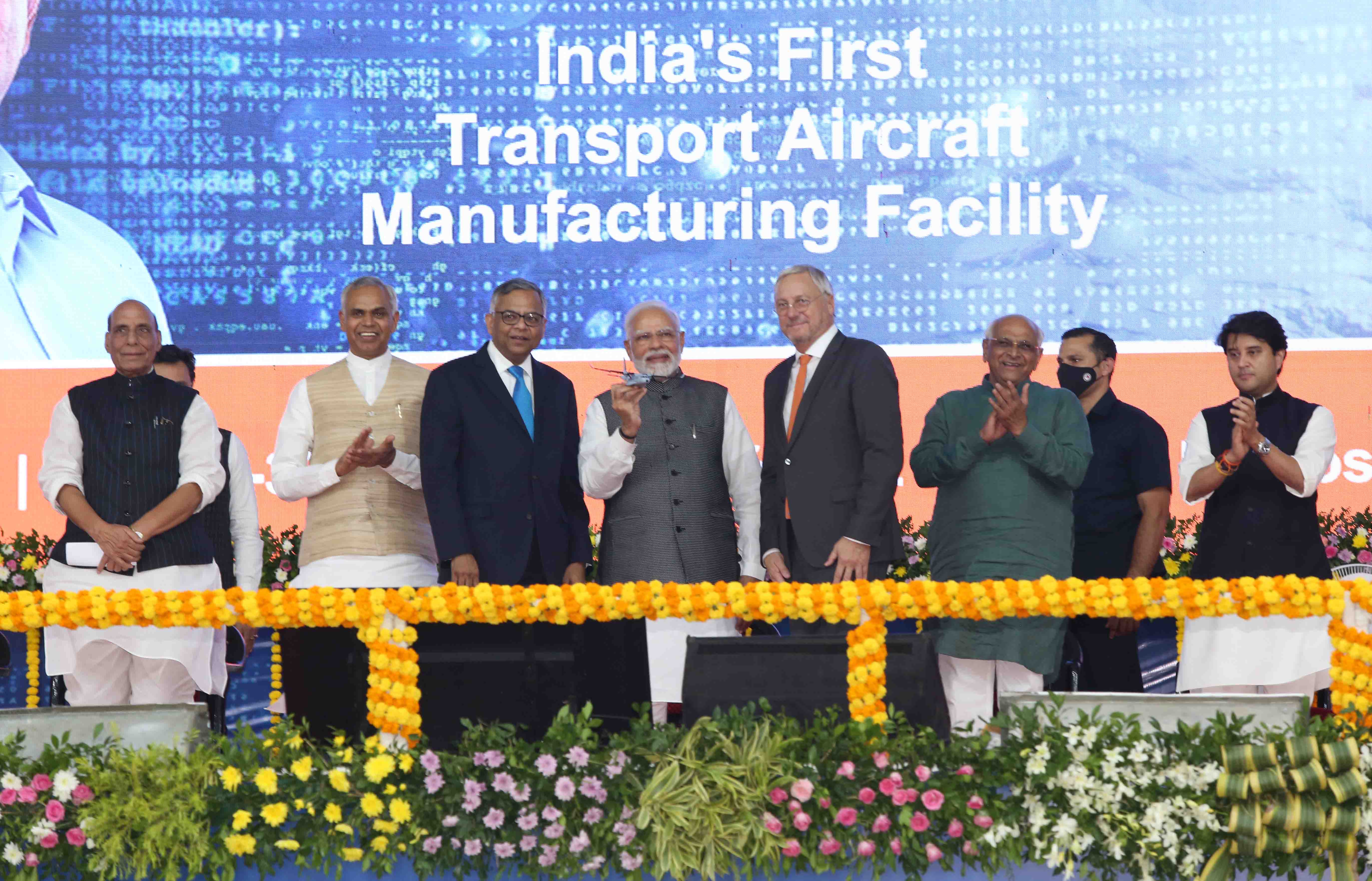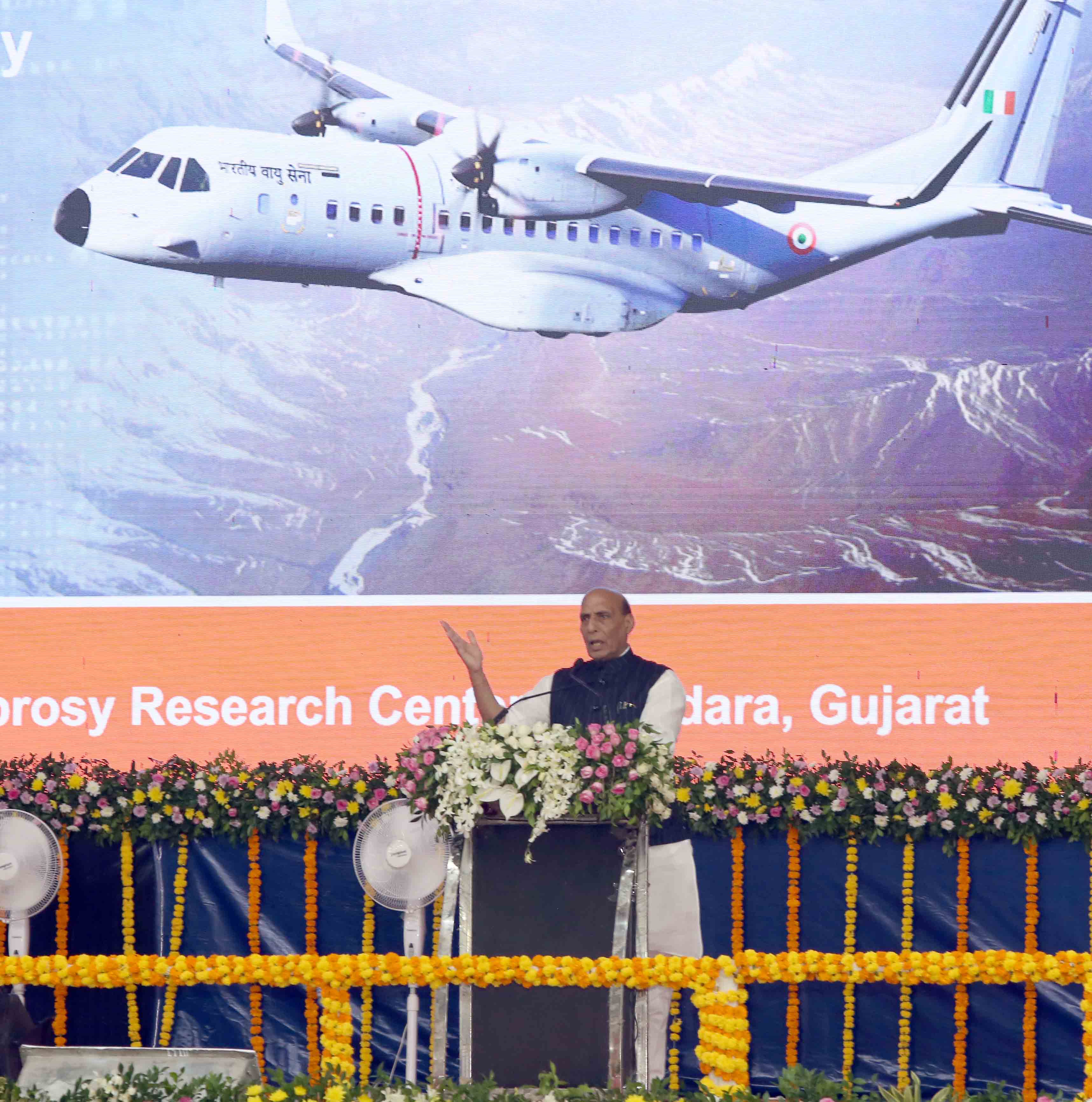Prime Minister Shri Narendra Modi laid the foundation stone of C-295 transport aircraft manufacturing facility – the country’s first in the private sector – in Vadodara, Gujarat on October 30, 2022. The facility will manufacture C-295 aircraft for the Indian Air Force (IAF) through collaboration between Tata Advanced Systems Limited and Airbus Defence and Space S.A., Spain. This is the first project of its kind in which a military aircraft will be manufactured in India by a private company. The total cost of the project is Rs 21,935 crore. The aircraft can be used for civilian purposes as well.
Prime Minister’s address
Addressing the gathering, the Prime Minister said that today we have taken a big step in the direction of making India the manufacturing hub of the world. He said India is making fighter jets, tanks, submarines, medicines, vaccines, electronic gadgets, mobile phones and cars that are popular in many countries. The Prime Minister remarked that India is moving forward with the mantra of ‘Make in India, Make for the World’ and now it is becoming a huge manufacturer of transport aircraft. The Prime Minister stated that he can foresee that India will soon be manufacturing big passenger aircraft that will proudly bear the words ‘Made in India’.
The Prime Minister added that the manufacturing facility has the power to transform the country’s defence and transport sector. He pointed out that it is for the first time that this big investment is taking place in the Indian Defence sector. Transport aircraft, manufactured at the facility, will not only strengthen the Armed Forces but also help in developing a new ecosystem of aircraft manufacturing “Vadodara, which is famous as a cultural and education centre, will develop a new identity as an aviation sector hub,” he said. The Prime Minister expressed happiness about the fact that more than 100 MSMEs are also associated with the project. He said the promise of ‘Make in India, Make for the World’ will gain new push from this land as the project will be able to take orders for export to other countries in the future.
Commenting on the fast-evolving aviation sector of India, Shri Narendra Modi said that we are about to enter among the top three countries in the world with regard to air traffic. UDAN scheme is helping in turning many commuters into air travellers, he said. Highlighting the increased demand for passenger and cargo aircraft, the Prime Minister stated that India will need more than 2000 aircraft in the next 15 years. The Prime Minister pointed out that today is a crucial step in this direction and India has already begun preparations for the same. Shri Modi also highlighted that India is presenting a global opportunity for the world that is beset by the COVID-19 pandemic & war and marred by disruptions in the supply chain. He pointed out that the growth momentum of India has been constant even among such tough circumstances. He explained that operating conditions are constantly improving and India is focussing on cost competitiveness as well as quality. “India is presenting the opportunity of low-cost manufacturing and high output,” the Prime Minister remarked. He added that India has a huge talent pool of skilled manpower.
Throwing light on the reforms made by the government in the last eight years, the Prime Minister said India is creating an unprecedented environment for manufacturing in the country. He gave examples of creating a simplified corporate tax structure while making it globally competitive, opening up the 100 per cent FDI route, opening up defence and space sectors for the private companies, reforming 29 central labour laws into four codes, abolishing 33,000 compliances, and creation of the Goods and Service Tax by putting an end to a complex web of dozens of taxes. He said, “a new saga of economic reforms is being written in India today and the manufacturing sector is reaping the most benefits from this apart from the states.”
Shri Narendra Modi credited a change in mindset for the success. He said, today India is working with a new mindset and a new work-culture. He recalled the time when the reigning notion was that the government was know-all, a mindset that suppressed the country’s talent and the power of the private sector. Now following ‘Sabka Prayas’, the government has started giving equal importance to the public and private sector. The Prime Minister also lamented the makeshift approach of the previous government where the manufacturing sector was kept barely functional through subsidy. There was neglect of basic facilities like logistics, electricity supply or water supply. “We have abandoned the makeshift approach of decision making and have come up with various new incentives for investors. We launched the Production Linked Incentive scheme, which made the change visible. Today our policies are stable, predictable and futuristic,” he said.
The Prime Minister also recalled a time when the dominant thought was to focus on the service sector as manufacturing was considered to be beyond reach. “Today, we are improving both services and manufacturing sectors,” he said. He underlined the importance of a holistic approach that focuses on both the manufacturing and service sector. “Today India is preparing to stay ahead of everyone in manufacturing,” he added. “This became possible because in the last eight years we focused on skill development and created an environment for it. By assimilating all these changes, today India’s development journey in the manufacturing sector has reached this stage,” the Prime Minister pointed out.
Highlighting the investment friendly policies of the government, the Prime Minister remarked that its benefits are clearly visible in FDI. In the last eight years, he said, companies from more than 160 countries have invested in India. He further elaborated that such foreign investments are not limited to certain industries but spreads across 61 sectors of the economy and covers 31 states of India. The Prime Minister informed that more than $3 billion has been invested in the aerospace sector alone. He noted that post 2014, investment in this sector grew five times of what was invested during the year 2000 to 2014. Shri Narendra Modi highlighted that in the coming years, the defence and aerospace sectors are going to be the crucial pillars of the ‘Aatmanirbhar Bharat’ campaign. “We aim to scale our defence manufacturing beyond $25 billion by 2025. Our defence exports will also exceed $5 billion,” he added.
The Prime Minister pointed out that the defence corridors being developed in Uttar Pradesh and Tamil Nadu will immensely help in scaling-up this sector. He also praised Ministry of Defence and Government of Gujarat for organising the biggest-ever DefExpo in Gandhinagar recently. He underlined that all the equipment and technologies displayed in the DefExpo were made in India. “The reflection of Project C-295 will also be visible to us in the DefExpo of the coming years,” the Prime Minister added.
Concluding the address, Shri Narendra Modi urged all those associated with the industry to make the most out of the unprecedented investment confidence in the country at the moment. He added that more thought must be given to helping the start-ups of the country in moving forward. The Prime Minister also stressed on increased participation of the private sector in the field of research. “If we push in this direction, we will be able to develop a stronger ecosystem of innovation and manufacturing. You always have to remember the mantra of Sabka Prayas,” the Prime Minister said.
In his address, Raksha Mantri Shri Rajnath Singh termed the laying of foundation stone of the first manufacturing facility of the private sector as a major milestone in the journey of ‘Aatmanirbharta’ in defence. He congratulated TATA consortium, Airbus and other organisations associated with the project, lauding them for promoting the Swadeshi movement of Father of the Nation Mahatma Gandhi who hailed from Gujarat.
The Raksha Mantri described the C-295 as a state-of-the-art aircraft, with superior capabilities and global standards, that will unprecedently add to the logistical capability of the IAF. “It is a matter of utmost importance and great pride that all 56 aircraft will be fitted with indigenous Electronic Warfare Suite to be manufactured by Bharat Electronics Limited & Bharat Dynamics Limited. Hundreds of MSMEs from across the country will be a part of this project. It is a shining example of meeting the requirements of the Armed Forces with collaborative efforts of the private sector and DPSUs,” he added.
Shri Rajnath Singh exuded confidence that the measures taken by Ministry of Defence to promote domestic manufacturing will not only cater to the needs of the Armed Forces, but also help in making India a net exporter of defence equipment/platforms. The journey of the aircraft manufactured at this facility will be the journey of mutual cooperation, defence empowerment and self-reliance, he added.
Commending the Prime Minister for his visionary leadership, the Raksha Mantri described Shri Narendra Modi as a statesman whose decisions are catering not only to the present needs of the country, but also equipping it to face the future. He said, the nation is making giant strides to achieve the Prime Minister’s vision of ‘Aatmanirbhar Bharat’ as it is a must for India to become one of the strongest nations in the world. “Due to the Prime Minister’s visionary leadership, India’s global image has transformed completely. New Delhi has now become a major voice on international platforms, with the world listening to us with attention and respect,” he added.
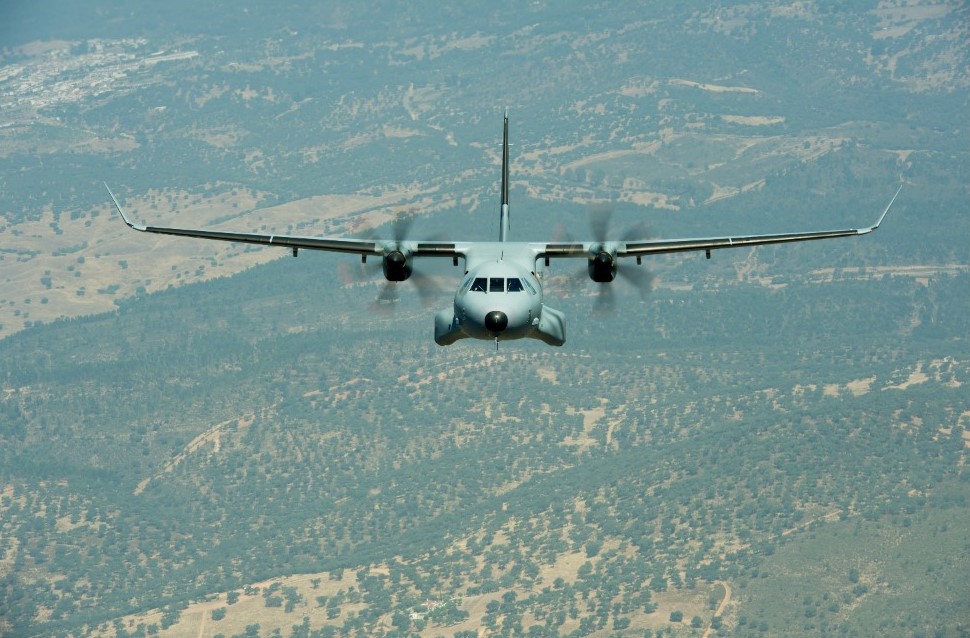
Timeline
Sixteen (16) aircraft will be delivered in flyaway condition. They are scheduled to be received between September 2023 and August 2025. Remaining forty (40) will be manufactured at the Vadodara manufacturing facility. The first Made in India aircraft is expected from September 2026.
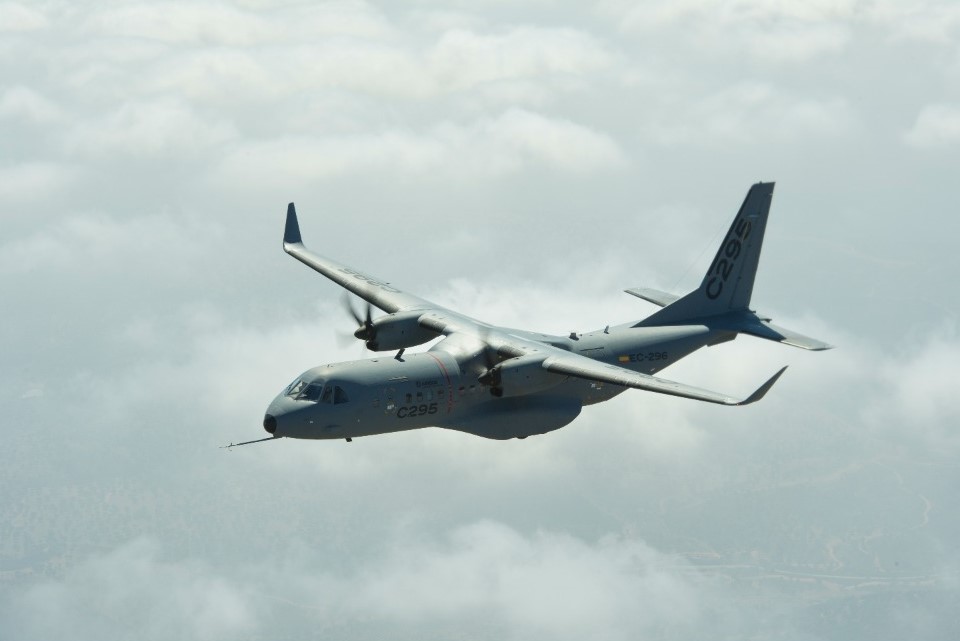
Aircraft capability
The C-295 is a transport aircraft of 5-10 tonne capacity with contemporary technology that will replace the ageing Avro aircraft of IAF. Robust and reliable, it is a versatile and efficient tactical transport aircraft which can perform a number of different missions. The aircraft, with a flight endurance of up to 11 hours, can carry out multi-role operations under all weather conditions. It can routinely operate day as well as night combat missions from desert to maritime environments. It has a rear ramp door for quick reaction and para dropping of troops and cargo. Short take-off/land from semi-prepared surfaces is another of its features.
The project offers a unique opportunity for the Indian private sector to enter into technology intensive and highly competitive aviation industry. It will augment domestic aviation manufacturing resulting in reduced import dependence and expected increase in exports.
Also, 96% of the total man hour work per aircraft that Airbus employs at its manufacturing facility at Spain will be undertaken in India by the TATA Consortium. Manufacturing of over 13,400 Detail Parts, 4,600 sub-assemblies and all the seven Major Component Assemblies will be undertaken in India, along with tools, jigs and testers. Various systems such as engines, landing gear, avionics, EW suite etc. will be provided by Airbus Defence & Space and integrated on the aircraft by the TATA Consortium. The aircraft will be tested as an integrated system by the TATA Consortium. The aircraft will be flight tested and delivered through a Delivery Centre at the TATA Consortium facility.
All 56 aircraft will be fitted with indigenous Electronic Warfare suite manufactured by Indian DPSUs – Bharat Electronics Ltd and Bharat Dynamics Limited. After completion of delivery of 56 aircraft to IAF, Airbus Defence & Space will be allowed to sell the aircraft manufactured in India to civil operators and export to countries which are cleared by the Government of India.
Employment Generation
The TATA Consortium has identified more than 125 in-country MSME suppliers spread over seven states. This will act as a catalyst in employment generation in the aerospace ecosystem of the country and is expected to generate 600 highly skilled jobs directly, over 3,000 indirect jobs and an additional 3,000 medium skill employment opportunities with more than 42.5 lakh man hours of work within the aerospace and defence sector of India. Nearly 240 engineers will be trained at Airbus facility in Spain.
Exhibition & other attendees
As part of the event, the Prime Minister also visited an exhibition which showcased the technological and manufacturing strides in the aerospace industry under ‘Aatmanirbhar Bharat’. Gujarat Governor Shri Acharya Devvrat; Minister of Civil Aviation Shri Jyotiraditya M Scindia; Gujarat Chief Minister Shri Bhupendrabhai Patel; Chief of Defence Staff General Anil Chauhan; Chief of the Air Staff Air Chief Marshal VR Chaudhari; Defence Secretary Dr Ajay Kumar; Secretary, Ministry of Civil Aviation Shri Rajiv Bansal; Chairman, Tata Sons Shri N Chandrasekaran; Chief Commercial Officer, Airbus Mr Christian Scherer and industry leaders were among those who attended the event.


